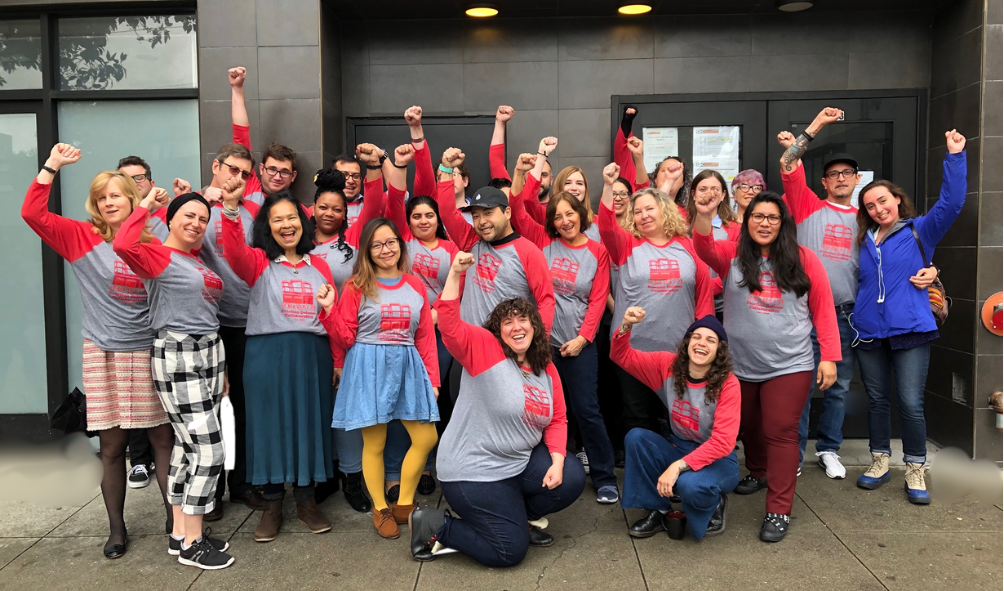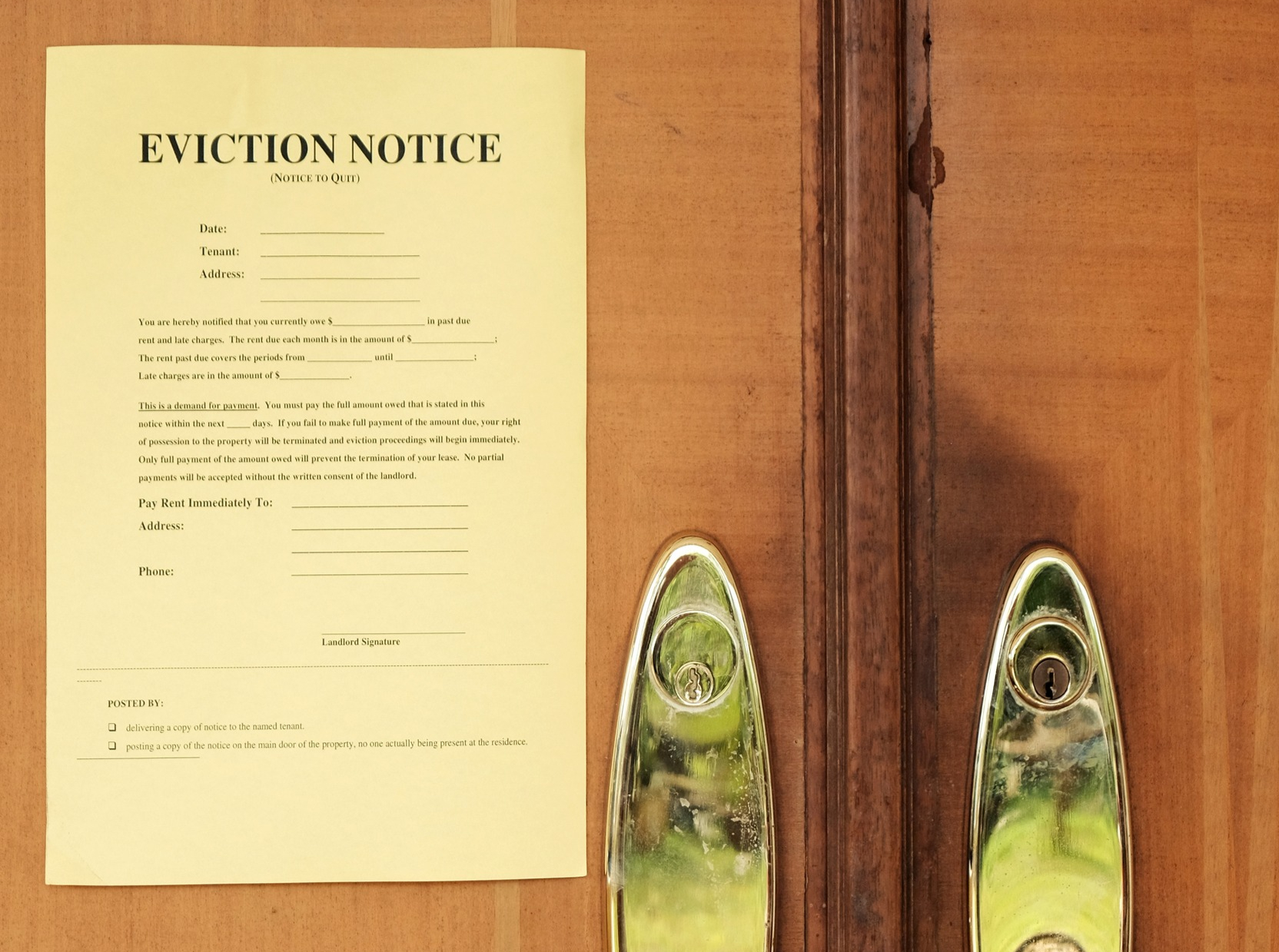Eviction can be overwhelming, but you do not need to navigate the process alone. San Francisco offers several resources, legal protections, and financial aid programs to help tenants avoid homelessness. This guide will explain what to do if you’re evicted, how to get the support you need, and your rights as a tenant.
What to Do If You Are Getting Evicted Right Now and Need Help
Getting evicted is terrifying, especially if you are unsure of your rights and what steps to take. The most important thing is to work quickly. There are steps you can take immediately to protect yourself and your home.
Contact a Lawyer Immediately
In San Francisco, tenants have the right to free legal representation if they are evicted. This is crucial because a lawyer can help you understand your rights, they can assess whether the eviction is legal, and represent you in court.
What to Do:
- Call the Eviction Defense Collaborative (EDC) at (415) 659-9184 or email legal@evictiondefense.org to request immediate legal assistance. Alternatively, come into our office at 976 Mission Street with your legal papers during our drop-in hours: Mondays, Tuesdays, Wednesdays, and Fridays from 10:00 to 11:30 a.m. and 1:00 to 2:30 p.m.
We provide free legal aid to tenants in San Francisco who are being evicted. The sooner you get in touch with us, the better. Legal experts can also help you understand the specific notice received (e.g., pay or quit, cure or quit) and explain what it means for your situation.
Know What Type of Eviction Notice You’ve Received
Understanding the type of eviction notice you’ve been given will help determine the best course of action (More on this below). Here’s a quick overview:
- Pay Rent or Quit: This option is available when you’re behind on rent. If you can pay, you should do so immediately. If you can pay the amount demanded within three days of getting the notice (weekends and holidays do not count), your landlord must accept the payment, and the eviction is stopped. If you can’t, apply for rental assistance (More information below).
- Cure or Quit: Given if you’re accused of violating your lease terms (e.g., unauthorized tenants, pets, property damage). Fix the violation within the notice period and respond to your landlord to let them know you did that.
- Unconditional Quit: This serious eviction notice often involves illegal activity or significant violations. This type requires immediate legal action.
- No Fault: Your landlord may end your lease without giving a reason or because of their own situation (they want to move in themselves, they want to go out of business as a landlord, they want to demolish the unit, etc.). You may be entitled to relocation assistance.
Important Note: Your situation may have protections even if you have received an eviction notice. Your lawyer can help determine whether the eviction is legal or violates local laws.
Apply for Rental Assistance (If You Owe Rent)
If you are behind on rent, emergency programs exist that can help prevent eviction by helping you pay off your overdue rent.
San Francisco Emergency Rental Assistance Program (SF ERAP):
This program provides financial assistance to eligible tenants behind on rent due to the pandemic or other financial hardships.
What to Do:
- Call the SF ERAP Helpline at (415) 653-5744, email help@sferap.org, or apply online through their website.
- If you are eligible, SF ERAP can pay your rent directly to your landlord and help you avoid getting evicted.
Eviction Defense Collaborative’s RADCo Program:
RADCo also offers emergency rental assistance to help tenants catch up on unpaid rent or cover moving costs.
What to Do:
- Email us: To reach our rental assistance team, send an email request to EDCRADCo@evictiondefense.org. To connect with our team specifically about rent subsidies, email subsidy@evictiondefense.org.
- Call us: (415) 947-0797
- To visit us in person: Our office is at 976 Mission Street.
- We are open for drop-ins on Monday, Tuesday, Wednesday, and Friday from 10:00 a.m. to 11:30 a.m. and 1:00 p.m. to 2:30 p.m.
Respond to the Eviction Notice
Once you understand your rights, you must respond to the eviction notice. This is done by submitting a legally proper written response to the landlord and court.
What to Do:
- Contact Eviction Defense Collaborative (EDC) to ensure you respond correctly and your answer is legally sound.
- If you’re contesting the eviction (e.g., whether it’s illegal, retaliatory, or discriminatory), your lawyer can help you file a defense in court.
**Do Not Ignore the Notice: If you receive an eviction notice, you must respond promptly. If you do not file a proper response with the court within 10 days, you will lose without any chance of presenting defenses and will be evicted faster.
Seek Emergency Housing or Shelter (If You Need to Move Quickly)
If you’re evicted and at risk of homelessness, San Francisco offers resources to help you secure emergency housing or shelter.
What to Do:
- Call the San Francisco Department of Homelessness and Supportive Housing at (628) 652-8000 for an immediate housing assessment and shelter placement through their Homeless Outreach Team (SFHOT).
- Contact organizations like Tenderloin Housing Clinic or Hamilton Family for added housing resources.
These services will help you find a temporary place to stay while you search for a permanent solution.
What to Do Depending on the Type of Eviction Notice You Receive
Understanding the type of eviction notice you receive is vital to determine how to respond. Every kind of notice requires a specific action to protect your rights. Here’s a list of the most common eviction notices and what to do if you receive one.
Pay Rent or Quit Notice
This is the most common notice, typically issued when a tenant falls behind on rent payments. It gives the tenant a chance to pay the overdue rent within a set period—usually three business days, excluding weekends and holidays—or get evicted.
What to Do:
- Pay the Rent: If you have the funds to pay the overdue rent, it’s in your best interest to pay it as soon as possible. Once the rent is paid, the eviction process should stop. Your landlord must accept your payment if you can pay the full amount within the notice period.
- Request Rental Assistance: If you can’t pay the rent, immediately apply for programs like San Francisco’s Emergency Rental Assistance Program (SF ERAP) to cover the overdue amount.
- Communicate with Your Landlord: If you are working on resolving the issue, contact your landlord and let them know. If you’re negotiating, keep written communication records to show you are trying to resolve the issue.
- Seek Legal Help: Contact a lawyer if you cannot afford to pay or find assistance quickly. They can help you determine whether the eviction is valid and whether there are any potential defenses.
If you cannot pay the rent or the landlord refuses a payment plan, contact us at (415) 659-9184 or email legal@evictiondefense.org.
Cure or Quit Notice
This notice is issued when you’ve violated a term in your lease (e.g., unauthorized tenants, pets, or property damage), and the landlord gives you a chance to “cure” the violation, meaning to fix the issue, within a set period—usually 3 days, excluding weekends and holidays.
What to Do:
- Fix the Violation: If you can correct the issue (e.g., removing unauthorized pets or repairing damage) as soon as possible. Document the fix with photos or receipts.
- Respond in Writing: Once you’ve resolved the violation, send a written response to your landlord confirming that the issue has been addressed. This will serve as evidence that you took action to cure the violation.
- Negotiate: If the violation is minor or you need more time to fix it, negotiate with your landlord. Be proactive in communicating with them about your plan to remedy the situation.
- Get Legal Advice: If you cannot fix the violation or if the eviction feels unjust (e.g., your landlord accuses you of something inaccurately), contact a lawyer to see if there’s a way to contest the eviction. A Tenant Right to Counsel attorney can also help you prove that you cured within the 3 days or help you obtain extra time to fix the problem.
*If you and the landlord cannot agree, request mediation to resolve the issue. You can find mediation services through the San Francisco Rent Board or the CIS.
Unconditional Quit Notice
This is a serious notice often used in major violations, such as illegal activity, severe property damage, disturbing the neighbors, or repeated lease violations. Unlike the Cure or Quit notice, you do not have the option to fix the issue. You are required to vacate the property by a specific date.
What to Do:
- Consult a Lawyer Immediately: An Unconditional Quit notice means you could face immediate eviction and should seek legal representation immediately. A lawyer will review whether the notice is valid or if it violates your rights in any way.
- Assess the Situation: If you believe the notice is unfair or based on faulty grounds (e.g., mistaken identity or misunderstanding), your lawyer may help you fight it in court.
- Prepare to Move: If the eviction is legal and you can’t contest it, begin preparing for your move. You may be able to negotiate a timeline with your landlord, especially if you need additional time to relocate. You may also be able to negotiate an agreement whereby you can stay in your home, conditioned on behavior changes.
No Fault Notice
It’s typically only allowed if you have a month-to-month lease or your lease agreement is nearing its end. With rare exceptions, it still requires a proper reason, such as your landlord wanting to make substantial renovations, demolish the unit, or move in themselves or a relative.
What to Do:
- Understand the Law: If you’ve been given a No Fault eviction notice and you’ve lived in the property for over a year, you may be entitled to substantial relocation assistance under San Francisco’s rent control laws.
- Check the Timing: In San Francisco, the landlord must give you at least 30 days’ notice if you’ve been in the unit for less than a year and 60 days if you’ve been there for more than a year. If the landlord doesn’t follow these time requirements, the eviction may not be valid.
- Negotiate with Your Landlord: A landlord sometimes issues a No Fault eviction to raise rent or push out tenants. If you can’t afford to move, consider negotiating with your landlord for more time to relocate or stay at your current rent rate.
- Legal Help: If the eviction is unjust or violates local rent control laws, consult a lawyer to explore your options for contesting it.
*In cases of no-fault eviction, especially when it involves the owner’s move-in, tenants may have the right to relocation assistance (funds for moving costs). If you cannot find a new place or need help with moving costs, consider applying for relocation aid through the SF Rent Board or other local programs.
Ellis Act Eviction Notice (Owner’s Right to Evict for Redevelopment)
Ellis Act is a law in California that allows property owners to evict tenants to remove the property from the rental market. This usually happens when a landlord plans to sell or redevelop the property, often converting it to another use, such as condos. This type of eviction is often used when tenants live in rent-controlled units.
What to Do:
- Know Your Rights: Under the Ellis Act, tenants are usually entitled to relocation assistance, which can be significant, especially in cities like San Francisco.
- Check the Timeline: The landlord must provide a 120-day notice extended to one year for elderly or disabled tenants.
- Relocation Assistance: In many cases, you’re entitled to financial help to move.
- Legal Help: If you feel the eviction violates the law or are not offered relocation assistance, contact a lawyer to contest it.
How to Get Help from the Eviction Defense Collaborative (EDC)
If you are getting evicted in San Francisco, we are a key resource for legal aid and financial support. Here’s how to access our services:
Contact Us Immediately
Phone: Call (415) 659-9184 for urgent assistance.
Email: Contact legal@evictiondefense.org with the subject “Urgent: Facing Eviction.”
Visit us in person: Our office is at 976 Mission Street. We are open for drop-ins on Monday, Tuesday, Wednesday, and Friday from 10:00 a.m. to 11:30 a.m. and 1:00 p.m. to 2:30 p.m
Provide Essential Information
Make sure to have these details ready:
- Eviction Notice: Type of eviction and any deadlines.
- Lease Information: A copy of your rental agreement, if available.
- Current Situation: Describe your housing situation, including financial hardship, rent arrears, or past assistance received.
Qualify for Assistance
- Free Legal Help: We provide free legal assistance through the Tenant Right to Counsel (TRC) program. If eligible, they will assign a lawyer to represent you.
- Rental Assistance: Through the RADCo program, we can assist with rent payments if you’re behind.
Follow EDC’s Instructions
Once you’ve contacted us, we will:
- Conduct an initial consultation to assess your case.
- Provide legal representation in court if you qualify.
- Help you apply for rental assistance programs like SF ERAP and RADCo.
Stay in Contact
- Keep in touch with us throughout the process.
- Attend court dates and follow any instructions given by your EDC lawyer.
Access Additional Support
- Housing Resources: We may refer you to other programs like SF Rent Board or emergency housing.
- Emergency Housing: If you are at risk of homelessness, we can connect you to emergency shelter options through the Coordinated Entry System.
Additional Essential Tips for Tenants Evicted in San Francisco
Here are some essential considerations that can help you navigate the eviction process in San Francisco:
Essential San Francisco Laws & Protections
- San Francisco Rent Control: If you live in a building built before 1979, your unit is likely protected by rent control, which limits rent hikes and eviction grounds.
- Rent Board Protections: San Francisco has strong laws that prevent illegal eviction practices. If your eviction seems retaliatory or violates the city’s housing rules, contact the San Francisco Rent Board at (415) 252-4600.
Eviction Protection for COVID-19-Related Issues
If the rent owed was accrued between March 1, 2020, and September 1, 2023, tenants who experienced COVID-19 financial distress might still have protections. Landlords could pursue this debt in small courts but not through eviction. As of now, in 2025, all COVID-19-specific protections have expired. The city’s eviction moratorium concluded in August 2023. If you have a small claims court proceeding due to COVID-19-related rent owed, please contact Bay Area Legal Aid at (800) 551-5554.
Temporary Eviction Delay (Stay of Execution)
If you have received an eviction judgment, you may be eligible to request a delay in the eviction process. This “stay of execution” could provide temporary relief. You can request it at the San Francisco Superior Court with help from an attorney at EDC.
Know About “Buyout” Offers (Eviction Buyout Agreements)
Some landlords may give a lump sum to the tenants in exchange for emptying the unit. While tempting, you must be careful as these offers can limit your rights, and the payment may not be enough to enable you to afford ongoing replacement housing costs. Contact a lawyer before accepting a buyout offer to ensure it’s fair.
Know Your Rights for Repairs and Habitability
Right to Habitable Conditions: Tenants have the right to live in habitable units. If your unit has serious issues, such as poor plumbing or pest infestations, you have the right to request repairs. If the landlord fails to act, it may be grounds for defending against getting evicted.
Action: If repairs aren’t made, you can submit a complaint to the San Francisco Department of Building Inspection.
Avoid Self-Representation in Court (If Possible)
- Why Legal Help is Key: Eviction court can be complicated, and even small mistakes can lead to an unfavorable outcome. It’s advisable to have legal representation.
- Free Legal Representation: EDC provides free legal services to low-income tenants, even if they don’t qualify for rental assistance.
San Francisco’s Rent Control FAQs and Resources
San Francisco Rent Board answers general questions and provides valuable resources about rent increases, eviction protections, and required notices. For detailed information, visit their website or contact them directly for help navigating your rights.
Housing Discrimination
It’s illegal for landlords to evict tenants based on race, gender, religion, or other protected categories. Contact Fair Housing Advocates of Northern California or EDC for help if you suspect discrimination.
Action: You can submit a complaint to the San Francisco Human Rights Commission, contact the California Civil Rights Department, or consult a lawyer to determine your legal rights.
San Francisco Housing Crisis and Tenant Organizing
If you are unfairly evicted or face an unjust rent increase, joining a tenant group or union can amplify your voice. Organizations like Tenants Together advocate for tenant rights in San Francisco.
Key Takeaways: Your Next Steps for Protection and Support
Getting evicted is a stressful experience, but you don’t have to navigate it alone. San Francisco offers legal protections and resources to help you protect your rights and avoid homelessness. Whether you’re dealing with rent control issues or need immediate legal aid, we are here to provide the necessary help you need.
If you are facing eviction, don’t wait until it’s too late. Contact us immediately for free legal aid and other resources. Stay informed about your rights, and remember that help is available in all phases.
Get Help Now
If you need immediate assistance, contact us today at (415) 659-9184 or via email at legal@evictiondefense.org. For more information on tenant protections, visit the San Francisco Rent Board website.
Act now—protect your rights and your home!




